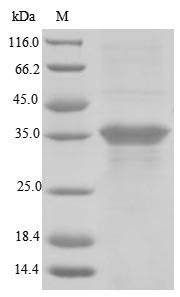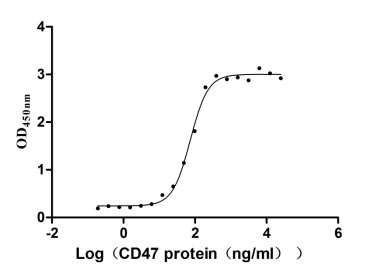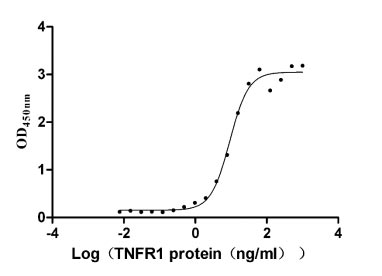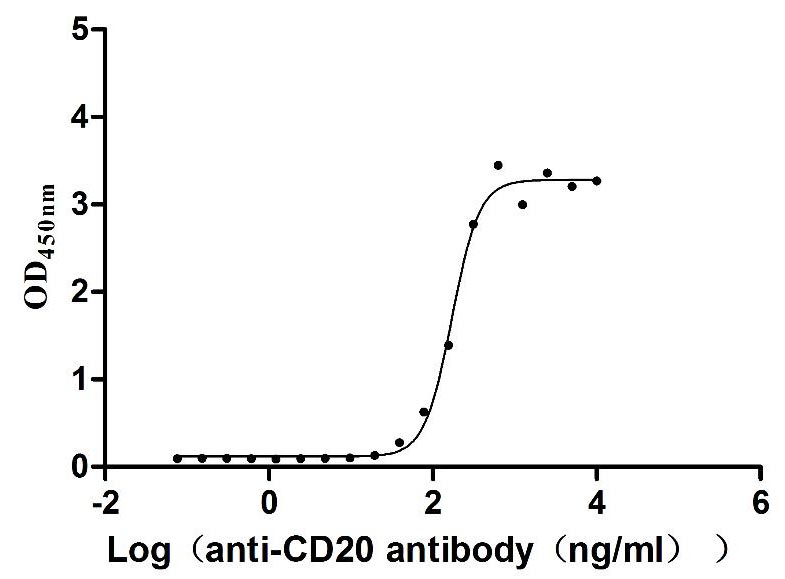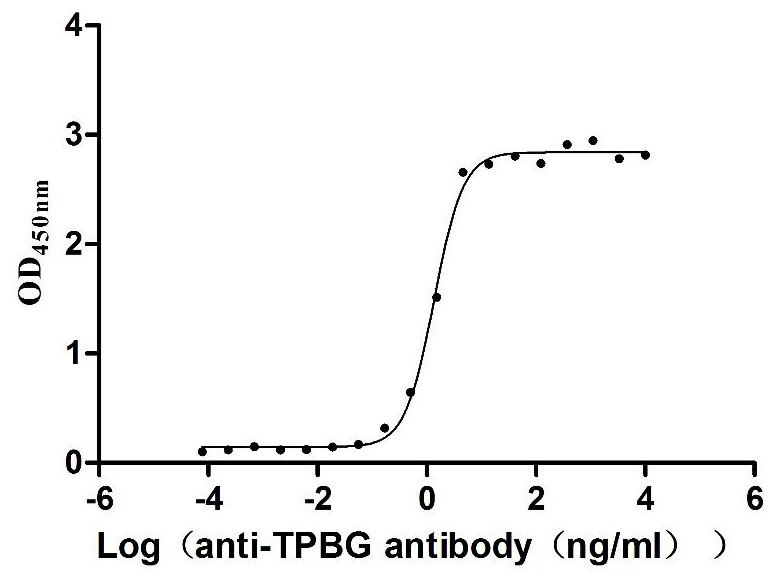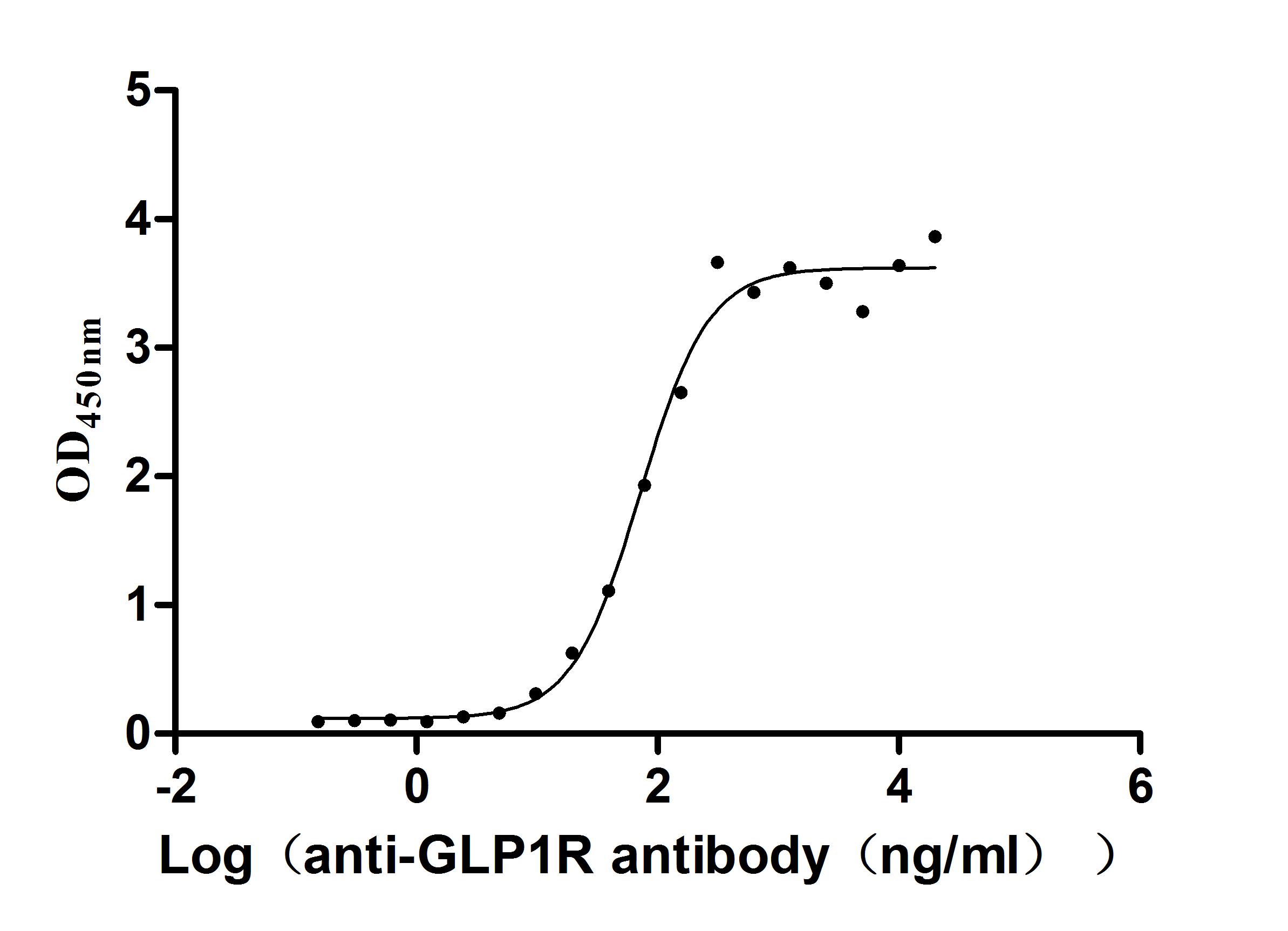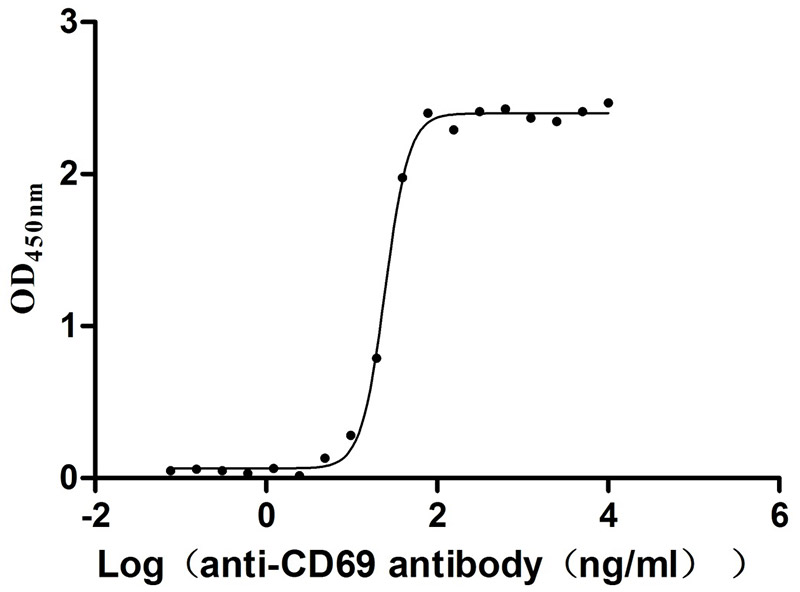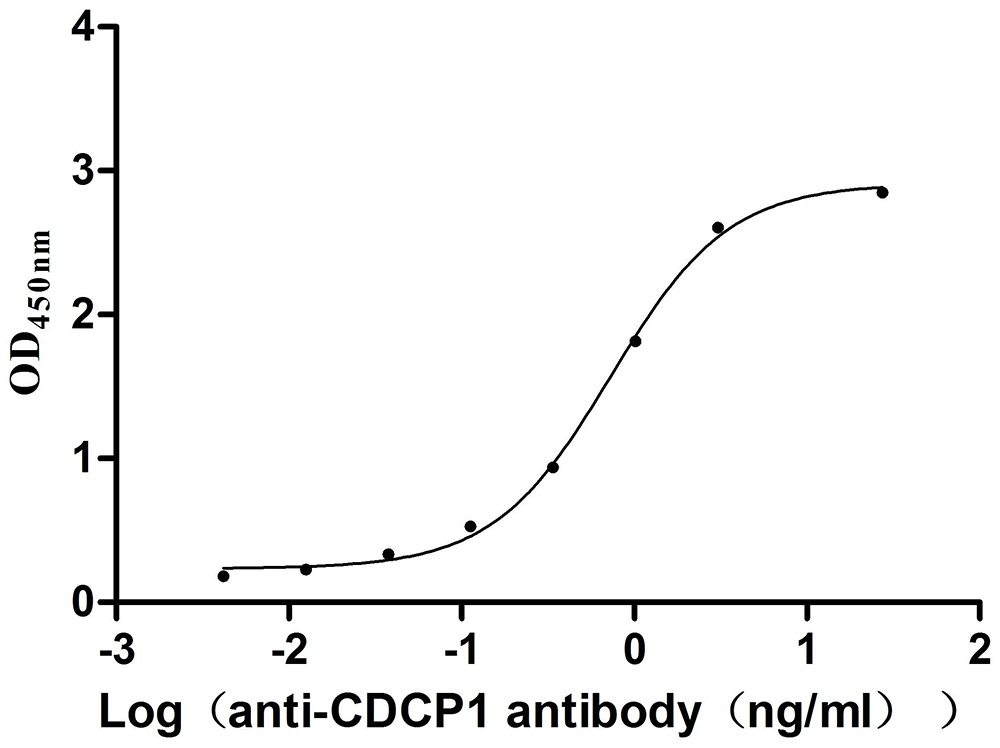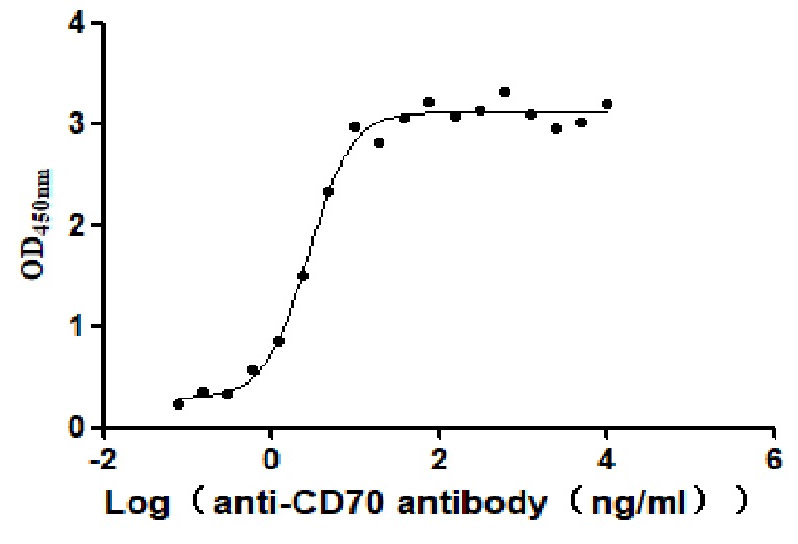Recombinant Human Blood group Rh (D) polypeptide (RHD), partial
In Stock-
中文名稱:人RHD重組蛋白
-
貨號:CSB-EP019677HU
-
規格:¥1836
-
圖片:
-
其他:
產品詳情
-
純度:Greater than 85% as determined by SDS-PAGE.
-
基因名:
-
Uniprot No.:
-
別名:RHD; Blood group Rh(D polypeptide; RHXIII; Rh polypeptide 2; RhPII; Rhesus D antigen; CD antigen CD240D
-
種屬:Homo sapiens (Human)
-
蛋白長度:Partial
-
來源:E.coli
-
分子量:33.6 kDa
-
表達區域:388-417aa
-
氨基酸序列LNLKIWKAPHEAKYFDDQVFWKFPHLAVGF
Note: The complete sequence may include tag sequence, target protein sequence, linker sequence and extra sequence that is translated with the protein sequence for the purpose(s) of secretion, stability, solubility, etc.
If the exact amino acid sequence of this recombinant protein is critical to your application, please explicitly request the full and complete sequence of this protein before ordering. -
蛋白標簽:N-terminal 6xHis-GST-tagged
-
產品提供形式:Liquid or Lyophilized powder
Note: We will preferentially ship the format that we have in stock, however, if you have any special requirement for the format, please remark your requirement when placing the order, we will prepare according to your demand. -
緩沖液:Tris-based buffer,50% glycerol
-
儲存條件:Store at -20°C/-80°C upon receipt, aliquoting is necessary for mutiple use. Avoid repeated freeze-thaw cycles.
-
保質期:The shelf life is related to many factors, storage state, buffer ingredients, storage temperature and the stability of the protein itself.
Generally, the shelf life of liquid form is 6 months at -20°C/-80°C. The shelf life of lyophilized form is 12 months at -20°C/-80°C. -
貨期:3-7 business days
-
注意事項:Repeated freezing and thawing is not recommended. Store working aliquots at 4°C for up to one week.
-
產品描述:
The N-terminal 6xHis-GST tag was fused to the gene fragment corresponding to the 388-417aa of the human RHD protein and then was cloned into an expression vector. The expression vector was transformed into the E.coli for expression. The generated product was purified and separated to obtain the recombinant human RHD protein. Its purity is higher than 85%. It showed an apparent molecular weight of about 34 kDa under SDS-PAGE condition.This recombinant human RHD protein may be used in cardiovascular research.
RHD is a gene encoding a protein named blood group Rh(D) polypeptide and belongs Rh subfamily which consist of RHD, RHCE, RhAG, RhBG, and RhCG. RHD has sequence similarity to others and is restricted to tissues or cell lines expressing erythroid characters. It was proposed that the erythrocyte Rh complex is a heterotrimer of RhAG, RhD, and RhCE protein subunits. Diseases associated with RHD include Hemolytic Disease Of Fetus And Newborn, Rh-Induced and Blood Group, Rh System.
-
Datasheet & COA:Please contact us to get it.
相關產品
靶點詳情
-
功能:May be part of an oligomeric complex which is likely to have a transport or channel function in the erythrocyte membrane.
-
基因功能參考文獻:
- 4 novel RHD alleles, each characterized by a single nucleotide substitution were identified. RHD*67T, RHD*173T, and RHD*579C give rise to a weak D phenotypical expression. Their corresponding amino acid changes are predicted to be located in the membrane-spanning or intracellular domains of the RhD protein. RHD*482G is the 4th substitution. PMID: 29052223
- Extensive studies show that the RHD*1227A is the most prevalent DEL allele in East Asian populations and may have confounded the initial molecular studies. PMID: 29214630
- The most prevalent DEL allele was RHD*DEL1 (c.1227G>A), which is proven to be immunogenic. A high frequency of RHD*Psi was detected in the donors with nondeleted RHD alleles (31%), far superior to the frequency of RHD variant alleles (15.5%). PMID: 29193119
- Absence of the whole RHD gene is common among RhD negative blood donors from Qingdao region, and there are rich genetic polymorphisms for this locus PMID: 29188626
- The RHD 1227G>A mutation contributes to the molecular basis of Del phenotype in the Taiwanese population. The point mutation results in aberrant frame shift or exon deletion transcripts and generates D protein with weak antigen presenting function. PMID: 26774048
- In this mixed Brazilian population, the most frequent weak D types were 1, 4, 3 and 2 (frequencies of 4.35%, 2.32%, 1.46% and 0.29%, respectively; total of 8.41%) and partial D was found in 2.90% of samples carrying the RHD gene. For samples with inconclusive RhD typing, 53.33% of them presented weak and partial RHD, and 43.75% had concomitantly more than one RHD variant PMID: 27184292
- sequence comparisons revealed high sequence similarity between Patr_RHbeta and Hosa_RHCE, while the chimpanzee Rh gene closest to Hosa_RHD was not Patr_RHa but rather Patr_RHy PMID: 26872772
- Six weak D types in the Russian Federation: the most common type 3 (49.2%) and type 1 (28.6%), type 2 (14.3), type 15 (4.8%), type 4.2 (DAR) (1.6%) and type 6 (1.6%). PMID: 27459619
- The frequency of RhD negative homozygosity in the Cypriot population was estimated to be 7.2%, while the frequencies of RHD hemizygosity and RhD positive homozygosity was calculated to be 39.2 and 53.6%, respectively. PMID: 27036548
- Occurrence of partial RhD alleles in the Tunisian population. PMID: 26482434
- Reduced expression of D antigen is caused not only by missense mutation of the RHD gene, but also by silent mutation that may affect splicing. PMID: 26340140
- Loss of heterozygosity of RhD gene on chromosome 1p in acute myeloid leukemia. PMID: 25495174
- The data indicate that partial DEL women appear at risk of alloimmunization to the D antigen. PMID: 26033335
- Weak D type 4.0 appears to be the most prevalent weak D in our population. However, all samples must be sequenced in order to determine the exact subtype of weak D type 4, since weak D type 4.2 has considerable clinical importance PMID: 25369614
- Paternal RHD zygosity determination in Tunisians: evaluation of three molecular tests. PMID: 24960665
- Serologic findings of RhD alleles in Egyptians and their clinical implications. PMID: 25219636
- Despite the enormous diversity of RHD alleles, first-line weak D genotyping was remarkably informative, allowing for rapid classification of most samples with conspicuous RhD phenotype in Flanders, Belgium. PMID: 25413499
- Splicing is altered in RHD*weak D Type 2 allele, a rare variant most commonly found in Caucasians; RHD including the full-length Exon 9 is transcribed in the presence of the c.1227G>A substitution frequently carried by Asians with DEL phenotype. PMID: 25808592
- Among all donors 89.00% and 10.86% were D-positive and D-negative, respectively, while 0.14% (n=55) of the donors were found to be weak D-positive. PMID: 24960662
- The frequency of D variants detected by IAT allele RHD(M295I) was 1:272 in D negative donors. Obviously, DEL phenotype is more common in some parts of European population than initially thought. PMID: 24556127
- New RHD variant alleles. PMID: 25179760
- Currently, it seems to be difficult to observe any new RHD alleles in the Han Chinese population. D prediction in this population is easier because popular alleles are dominant, accounting for about 99.80% of alleles in D-negative people. PMID: 24333088
- In Han Chinese people with weak D serotyping, 8 weak D and 4 partial D alleles were found. 3 new weak D alleles (RHD weak D 95A, 779G, and 670G) and one new partial D allele (RHD130-132 del TCT) were identified. PMID: 25070883
- DEL/weak D-associated RHD alleles were found in 2.17% of Australian D-, C+ and/or E+ blood donors. PMID: 24894016
- RHD alleles and D antigen density among serologically D- C+ Brazilian blood donors. PMID: 24267268
- In this study, D antigen density on the erythrocyte surface of DEL individuals carrying the RHD1227A allele was extremely low, there being only very few antigenic molecules per cell, but the D antigen epitopes were grossly complete. PMID: 24333082
- The prevalence of D-/RHD+ samples is higher than that observed in Europeans. More than 50% of the RHD alleles found were represented by RHDpsi and RHD-CE-D(s) showing the African contribution to the genetic pool of the admixed population analyzed. PMID: 24819281
- A method of genotyping has been developed in the laboratory. genotyping results of 200 pregnant women have been compared with RH1 phenotype at birth. PMID: 24559796
- We conclude that noninvasive fetal RHD genotyping from maternal blood provides accurate results and suggests its viability as a clinical tool for the management of RhD-negative pregnant women in an admixed population. PMID: 24615044
- Two molecular polymorphisms to detect the (C)ce(s) type 1 haplotype. PMID: 24333080
- This study analyzes the phenotype and frequency of RhD and tetanus toxoid specific memory B cells in limiting dilution culture. PMID: 24965774
- Data indicate that non-invasive prenatal testing of cell-free fetal DNA (cffDNA) in maternal plasma can predict the fetal RhD type in D negative pregnant women. PMID: 24204719
- DIV alleles arose from at least two independent evolutionary events. DIV Type 1.0 with DIVa phenotype belongs to the oldest extant human RHD alleles. DIV Type 2 to Type 5 with DIVb phenotype arose from more recent gene conversions. PMID: 23461862
- RHD*DARA and RHD*DAR2 are the same allele. Furthermore, the alleles RHD*DAR1.2 and RHD*DAR1.3 both exist; however, the silent mutation 957G>A (V319) showed no influence on the RhD phenotype. PMID: 23902153
- All novel weak D types expressed all tested D epitopes. PMID: 23550956
- Only 0.2% of D- Polish donors carry some fragments of the RHD gene; all of them were C or E+. Almost 60% of the detected RHD alleles may be potentially immunogenic when transfused to a D- recipient. PMID: 23634715
- This study is the first to describe weak D types caused by intronic variations near the splice sites in the RHD gene, which is supported by the genotyping results combined with serologic profiles and bioinformatics analysis. PMID: 23216299
- RHD variants were identified in 91.6% of the 430 studied samples. Two of the nine previously undescribed variants, c.335G>T and c.939G>A, were found to cause aberrant mRNA splicing by means of a splicing minigene assay. PMID: 23228153
- Hemizygous RHD subjects demonstrated significantly higher platelet increases and peak platelet counts than homozygous RHD subjects. PMID: 23712954
- The RHD*weak 4.3 allele with markedly reduced antigen D expression was shown to be associated with an altered RHCE gene formation leading to the expression of C(X) and VS. PMID: 22288371
- modulates the influence not only of latent toxoplasmosis, but also of at least two other potentially detrimental factors, age and smoking, on human behavior and physiology. PMID: 23209579
- RHD*DIVa and RHCE*ceTI almost always, but not invariably, travel together. This haplotype is found in people of African ancestry and the red blood cells can demonstrate aberrant reactivity with anti-C. PMID: 22804620
- RHD*DOL2, like RHD*DOL1, encodes a partial D antigen and the low-prevalence antigen DAK. PMID: 22738288
- The use of cell-free fetal DNA in prenatal noninvasive early detection of fetal RhD status and gender by real-time PCR is highly sensitive and accurate as early as the 11th week of gestation for RhD status and the 7th week of gestation for fetal sex. PMID: 21488716
- This deletion appears to represent not only the first large deletion associated with weak D but also the weakest of weak D alleles so far reported. PMID: 22420867
- Characterization of novel RHD alleles. PMID: 22320258
- The RHD genotyping proved to be a necessary tool to characterise RHD alleles in donors phenotyped as D- or weak D to increase the transfusion safety in highly racial mixed population. PMID: 22211984
- RHD homozygotes had nearly twice as many D antigen sites as hemizygotes. Expression of c or E antigens was associated with increased RBC D antigen expression, but presence of C or e antigens reduced expression. PMID: 22121029
- Anti-D investigations in individuals expressing weak D Type 1 or weak D Type 2 PMID: 21658048
- Distribution of weak D types in the Croatian population. PMID: 21269342
顯示更多
收起更多
-
亞細胞定位:Cell membrane; Multi-pass membrane protein.
-
蛋白家族:Ammonium transporter (TC 2.A.49) family, Rh subfamily
-
組織特異性:Restricted to tissues or cell lines expressing erythroid characters.
-
數據庫鏈接:
Most popular with customers
-
Recombinant Human Leukocyte surface antigen CD47 (CD47), partial (Active)
Express system: Mammalian cell
Species: Homo sapiens (Human)
-
Recombinant Human Tumor necrosis factor receptor superfamily member 1A (TNFRSF1A), partial (Active)
Express system: Mammalian cell
Species: Homo sapiens (Human)
-
Recombinant Dog B-lymphocyte antigen CD20 (MS4A1)-VLPs (Active)
Express system: Mammalian cell
Species: Canis lupus familiaris (Dog) (Canis familiaris)
-
Recombinant Human Trophoblast glycoprotein (TPBG), partial (Active)
Express system: Mammalian cell
Species: Homo sapiens (Human)
-
Recombinant Human Glucagon-like peptide 1 receptor (GLP1R), partial (Active)
Express system: Mammalian cell
Species: Homo sapiens (Human)
-
Recombinant Human Early activation antigen CD69 (CD69), partial (Active)
Express system: Mammalian cell
Species: Homo sapiens (Human)
-
Recombinant Mouse CUB domain-containing protein 1 (Cdcp1), partial (Active)
Express system: Mammalian cell
Species: Mus musculus (Mouse)
-
Recombinant Human CD70 antigen (CD70), partial (Active)
Express system: Mammalian cell
Species: Homo sapiens (Human)

